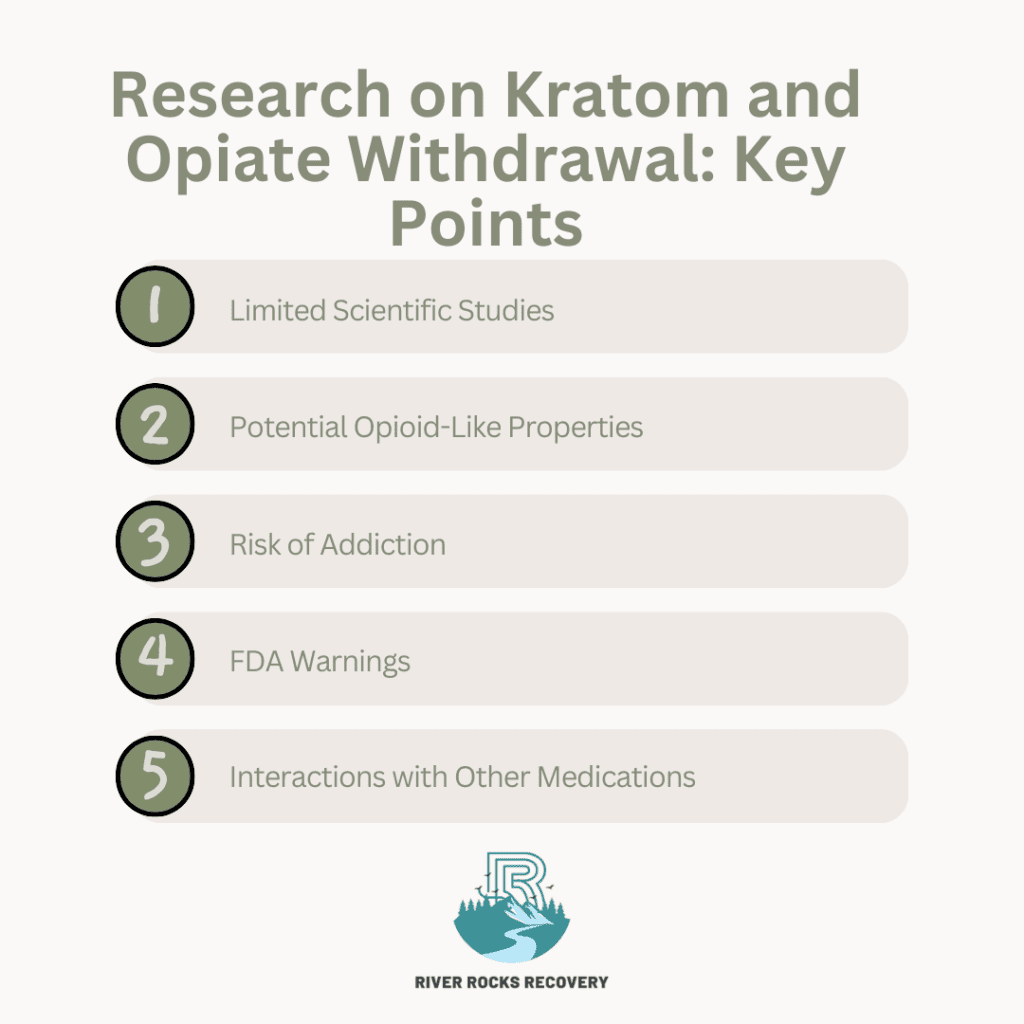Are you suffering from opiate addiction? Not only you; there are numerous people in the queue looking for treatment for opiate addiction.
Kratom is the Southeast Asian herb that came to notice due to its ability to lessen the symptoms associated with opiate withdrawal. Some users claim to be free of cravings, anxiety, and sleeplessness with the use of kratom, but it’s still unclear what the research says regarding kratom’s potential impact on opiate withdrawal symptoms.
So, let us dive into this article and find some studies to understand kratom and its relationship with opiate withdrawal in a better way.
Let’s begin!
Kratom: An Overview!
Kratom is a plant that contains chemicals that bind to opioid receptors in the brain, such as mitragynine and 7-hydroxymitragynine. Although kratom is not categorized as an opioid, this interaction can have effects that are comparable to those of opiates, including pleasure and pain alleviation.
However, its distinct chemical composition has made it useful as an opioid replacement, especially for the treatment of withdrawal symptoms.
Understanding Kratom and Its Effects
Kratom contains active compounds known as alkaloids, primarily mitragynine and 7-hydroxymitragynine. These alkaloids interact with opioid receptors in the brain, producing effects similar to opioids like morphine or codeine. For some, kratom acts as a stimulant in low doses, increasing energy and focus, while at higher doses, it mimics the sedative effects of opiates, which is why it’s sometimes used for managing withdrawal symptoms.
How Kratom May Affect Opiate Withdrawal?
Opiate withdrawal can cause muscle aches, nausea, insomnia, anxiety, and irritability. Because of its effects on opioid receptors, kratom may be able to lessen the severity of these symptoms. It is frequently viewed as a natural substitute for Medication-Assisted Treatment (MAT) drugs like buprenorphine or methadone. Supporters of kratom claim that it helps by:
- Reducing anxiety and irritability: Kratom can produce calming effects, which may help reduce the restlessness and anxiety associated with opiate withdrawal.
- Alleviating physical pain: Kratom’s interaction with opioid receptors may offer relief from the muscle aches and discomfort that are common during withdrawal.
- Boosting mood and energy: At lower doses, kratom may enhance mood and energy, helping individuals combat the fatigue and depressive symptoms that often accompany withdrawal.
- Reducing cravings: Kratom users report that it helps curb the intense cravings that are central to the withdrawal process.
To self-manage their withdrawal and escape the stigma and unwanted effects of pharmaceutical therapies, many users shift to kratom.
What Research Says? Explore the Multiple Studies!
Despite anecdotal evidence and widespread use, there is little study on kratom’s effectiveness in treating opiate withdrawal. Let’s see below-
Users Study: According to a 2017 survey that was published in the Journal of Addiction Medicine, a sizable percentage of kratom users said they used the plant to help them with the withdrawal symptoms of opioids. Numerous participants reported that kratom eased withdrawal symptoms, including anxiety and cravings.
Animal Studies: Preclinical studies have demonstrated that the active ingredients in kratom can lessen the symptoms of opiate withdrawal in animals. However, these results haven’t been completely confirmed in human trials yet.
Possibility of Dependency: Kratom carries certain hazards even though it could help with withdrawal symptoms. According to a 2019 study published in Drug and Alcohol Dependency, long-term kratom use may cause dependency and withdrawal symptoms such as tiredness, cravings, and irritability, which further sparked worries that kratom could lead to the emergence of a new addiction.
Unregulated and with a Mixed Legal Position: Kratom’s legal position differs from state to state and it is not approved by the FDA to treat opiate withdrawal. Because there is no regulation, there could be differences in the quality and purity of kratom products, which could be harmful to consumers’ health.
Is Kratom Good for Opiate Withdrawal?
It’s important to weigh the pros and cons of using kratom for opiate withdrawal. While some people find it helpful, scientific evidence is limited, and there’s a risk of negative effects and dependence. Thus, it is always preferable to speak with a healthcare provider such as River Rocks Recovery about safe and effective treatment alternatives, such as medication-assisted Treatment (MAT), behavioral therapy, and support groups.
The Research on Kratom and Opiate Withdrawal
While anecdotal evidence from kratom users suggests potential benefits for managing opiate withdrawal, the scientific community remains divided. Studies on kratom’s effectiveness and safety are still limited, and there are significant concerns regarding its potential for abuse and addiction.
Limited Scientific Evidence
Research into kratom’s ability to alleviate opiate withdrawal symptoms is still in its early stages. Some small studies suggest that kratom may have opioid-like properties, which could make it effective for temporarily easing withdrawal symptoms. However, these studies also highlight the risks of dependence on kratom itself. The U.S. Food and Drug Administration (FDA) and other regulatory bodies have raised concerns about kratom’s safety, particularly in terms of its addictive potential and its interaction with other medications.
Risks of Kratom Use
While kratom may provide short-term relief, it comes with its own risks:
- Addiction: Just like opioids, kratom can lead to physical dependence, meaning that users may experience withdrawal symptoms when they try to stop using it.
- Side effects: Kratom can cause a range of side effects, including nausea, vomiting, constipation, dizziness, and, in extreme cases, seizures or liver damage.
- Unregulated products: Because kratom is not regulated by the FDA, the quality and purity of kratom products can vary widely. Some products may be contaminated with harmful substances, increasing the risk of adverse health effects.
Alternatives to Kratom for Opiate Withdrawal
Rather than relying on unregulated and potentially harmful substances like kratom, individuals experiencing opiate withdrawal can benefit from evidence-based treatment options. At River Rocks Recovery, we offer a range of Addiction Treatment Programs designed to help individuals manage withdrawal symptoms and achieve lasting recovery.
- Medically supervised detox: A safe and controlled environment for withdrawal, where symptoms can be managed under the supervision of medical professionals.
- Cognitive-Behavioral Therapy (CBT): This therapeutic approach helps individuals identify negative thought patterns and develop healthier coping mechanisms for managing cravings and emotional distress during recovery.
- Dialectical Behavior Therapy (DBT): This therapy focuses on emotional regulation and stress management, which are crucial during the challenging withdrawal period.
- Outpatient Program (OP) and Intensive Outpatient Program (IOP): These flexible treatment options allow individuals to receive care while maintaining their daily responsibilities, offering support and therapy without requiring an overnight stay.
- Partial Hospitalization Program (PHP): A more intensive level of care, Partial Hospitalization Program provides structured treatment during the day, with patients returning home in the evenings.
Need help with Opiate Addiction? Call River Rocks Recovery!
Struggling with opiate addiction might be stressful, but you do not have to do it alone. At River Rocks Recovery, our Ohio Addiction Treatment Center offers a range of evidence-based therapies and personalized treatment plans that address both the physical and emotional challenges of recovery. Whether you’re looking for a Partial Hospitalization Program, Outpatient Program, or Intensive Outpatient Program, our team is committed to supporting you through every step of your journey. Our skilled team offers a variety of evidence-based therapies, such as detox, therapy, and continuous support. Contact River Rocks Recovery immediately to begin your journey toward long-term recovery.
Conclusion
While kratom has gained attention as a possible aid for opiate withdrawal, its risks and lack of comprehensive research make it a questionable choice for long-term recovery. If you or someone you know is struggling with opiate addiction, it’s crucial to seek professional help rather than relying on potentially addictive and unregulated substances like kratom. Call us at: (888) 905-6281 today to know more info.
FAQ: Can Kratom Alleviate Opiate Withdrawal Symptoms?
What is kratom, and why is it used for opiate withdrawal?
Kratom is a plant-based substance derived from the leaves of the Mitragyna speciosa tree. It contains alkaloids like mitragynine and 7-hydroxymitragynine, which interact with opioid receptors in the brain. Some people use kratom to alleviate opiate withdrawal symptoms such as anxiety, pain, and cravings, as it can mimic the effects of opioids in higher doses.
Does research support the use of kratom for opiate withdrawal?
The research on kratom’s effectiveness for opiate withdrawal is limited. While some studies suggest that it may help alleviate symptoms, its safety and potential for abuse raise significant concerns. The FDA has not approved kratom for any medical use, and there are risks of addiction and adverse side effects.
Is kratom safe to use during withdrawal?
Kratom is not without risks. It can lead to dependence, and withdrawal from kratom itself can result in symptoms such as irritability, nausea, and insomnia. Additionally, because kratom is unregulated, products may vary in potency or contain harmful additives, increasing the risk of side effects.
Can kratom be addictive?
Yes, kratom can be addictive. Similar to opioids, kratom can lead to physical dependence, and users may experience withdrawal symptoms when they stop taking it. This potential for addiction makes kratom a risky option for managing opiate withdrawal.
What are the side effects of using kratom?
Common side effects of kratom include nausea, vomiting, constipation, dizziness, dry mouth, and sedation. In more severe cases, kratom has been linked to liver damage, seizures, and even death, particularly when mixed with other substances.






























